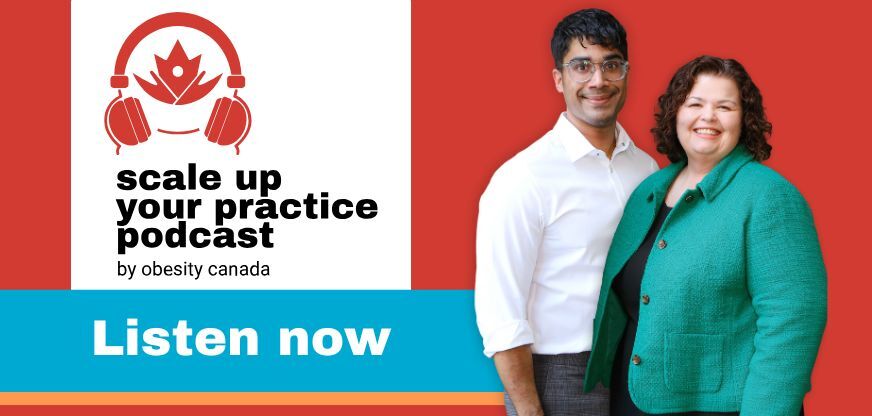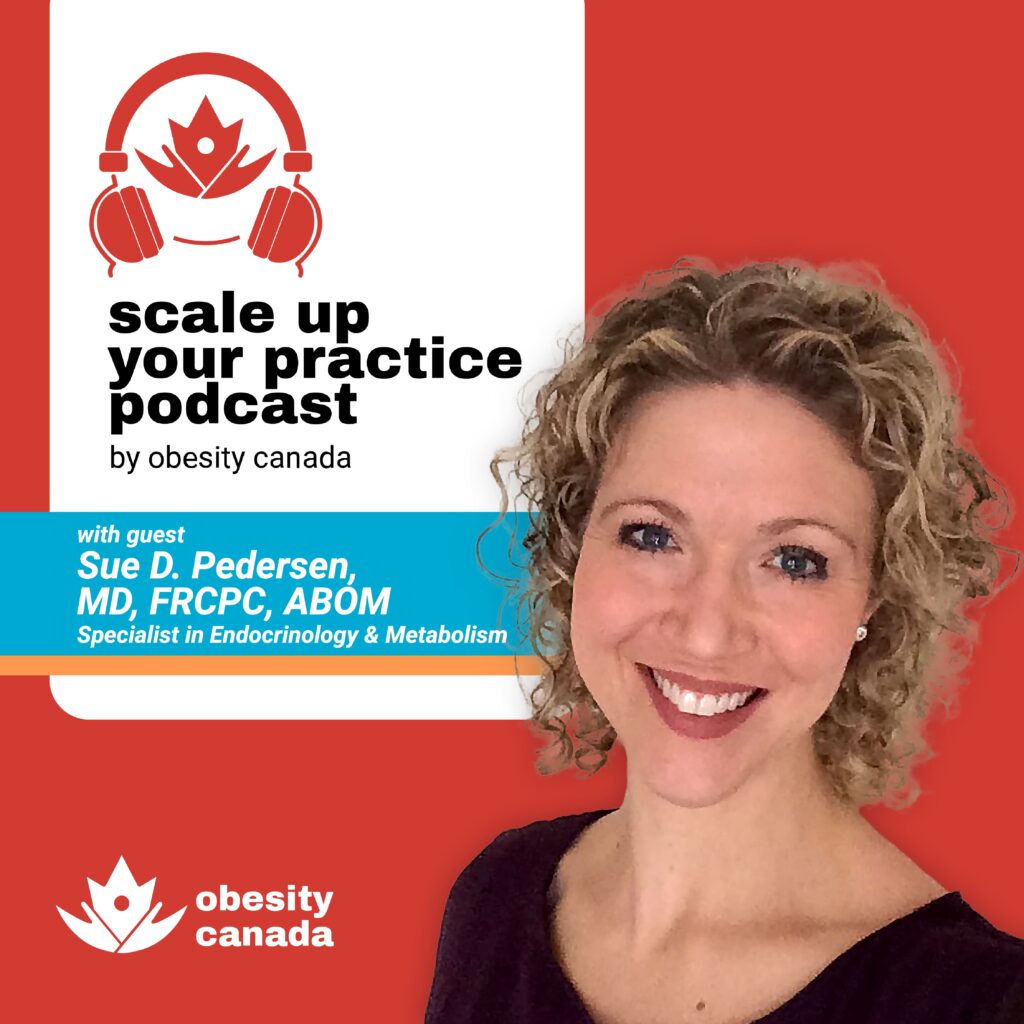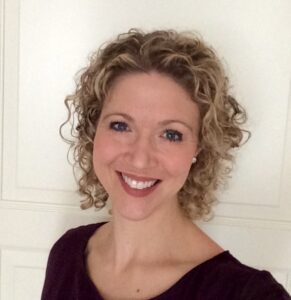– Welcome to Scale Up Your Practice, the podcast brought to you by Obesity Canada. I’m Dr. Roshan Abraham, a family physician and associate professor in the Department of Family Medicine at the University of Alberta. Every day in my practice, I see firsthand the complex realities of obesity, both for individuals and across our healthcare system.
– And I’m Michelle McMillan, a lived experience expert. In each episode, we bring together diverse voices, clinicians, researchers, and people living with obesity to explore the evolving world of obesity management. Our goal? To help you navigate this complex medical condition.
– Today’s episode has been sponsored by Eli Lilly Canada. Obesity Canada received an unrestricted educational grant for this episode. Today’s episode is the fourth of six in a series celebrating Canadian Excellence, where we get a chance to meet with Canadian experts and learn a little bit more about them and how they got into the field of obesity.
– Today we are thrilled to welcome global obesity expert, Dr. Sue Pederson.
– Hi Roshan. How are you doing?
– Good.
– Hi, Michelle.
– Well, It’s great to have you here.
– Great to be here guys. Thanks.
– Thank you so much for joining us. I know we’ve met each other in passing, probably had a chat or two at a conference, but why don’t we start with your background. How you got involved, what your education is, maybe what you do when you’re not doing this, and just give us a little background. That’d be awesome.
– Sure. I laugh because I’m not sure when I’m ever not doing this, but I have a bit of a life on the side. I’m an endocrinologist. I trained in Calgary. I went to medical school in the Nineteen-hundreds. I’ve been an endocrinologist for about 20 years now. And I’m also a diplomat of the American Board of Obesity Medicine, which I’ve been for I think about 10 years now. I spent some time at the University of Copenhagen on a research sabbatical a number of years ago. Um, in my spare time just to, I guess answer that question, I love to be active. I live in Calgary, so we’re close to the mountains. That’s one of the reasons why we live here. So I really like skate skiing and I like putting skins on my skis and walking up the mountain, just being in the beautiful outdoors. I like to cycle a lot as well.
– Do you like walking up the mountain rather than skiing down? Is that, is that correct?
– Yeah. People like to joke and say, Hey, you’re going the wrong way! I actually do have a lift ticket or a seasons pass, but I prefer the exercise, the work it takes to get up the mountain. I feel accomplished. It’s just peaceful and beautiful. Yeah, I really like it.
– As a fellow Calgarian, I shall wave from you from the chairlift and then ski down.
– It’s probably, it’s a lot more fun to ski that way, that’s for sure.
– So Sue, how did you get into obesity medicine?
– You know, it’s really been a passion of mine ever since I was training in endocrinology over 20 years ago. But back then it was such a, a raw field, which really didn’t have much in the way of good treatments and (there was) such a lack of understanding of the science of obesity. I felt that a lot of my patients were being stigmatized a lot with regards to weight, and we spend a lot of time treating their complications related elevated weight rather than addressing the weight concern itself. So I, I really saw a need to have more data, have more interest, have more healthcare professionals interested in this field, and I was just right at the front of that gate. I just couldn’t wait to get more involved in it, and I’ve never looked back.
– Wonderful.
– Wow. You’ve been in the field for a while, as you said, med school in the nineteen-hundreds. That’s okay. I went to engineering school in the nineteen-hundred, so it, it’s fine.
– I love saying that because people always gasp and go, she’s so old. I know. You gasped inside, you held it. You didn’t show it very well.
– Well Sue, I’m already showing my age to my students when I tell them that I graduated in the early, well, not early – mid, 2010s. So already I’m feeling my age compared to the medical students that I have to teach. So yeah, it’s just a rite of passage I feel in, in a lot of professions.
– Every day’s a gift age is a gift. I really believe that.
– Right.
– Yep.
– So you’ve been involved a long time, not to make you feel old that’s not the purpose of the question. And I imagine, I mean, there’s probably been a lot of highlights to it, but just for our audience, can you pick out a couple, maybe personally, maybe professionally, that really stand out to you over your career to this point?
– Well professionally, I am very humbly very proud of our Canadian obesity guidelines. Of course. You know, we rewrote them in 2020, and that was 14 years since they had been last updated. So that was a gargantuan undertaking. I’m the lead author of the Pharmacotherapy chapter. So we updated that in 2022, and we’re updating it again now, so we’ll have a 2025 update. And it’s a lot of work, but it’s really a labor of love and, it’s really a privilege and an honour to be able to lead that again for the third time. Really excited to share it with the world. It’s used everywhere, all over the world. Many countries have adopted it formally, with more to come. So I really feel like I’m making an important contribution to be part of that.
– Thank you so much. And anything personally that you’re proud of, just to get, get our listeners to know a little bit more about you?
– Well I have two wonderful nieces that I’m super proud of. They live in Calgary as well, my sister’s kids. We’re all very close. They call me “Mom” by accident, sometimes because we look a lot alike, my sister and I. But we’re very close and they’re just the most two wonderful little people in the world, so I’m very proud of them.
– So what’s one thing you want our listeners to know about obesity management?
– Well you know, I wish we didn’t, I wish we were already there, but we’re not. And what I’m talking about is weight bias and stigma. We still have a long way to go in breaking down that stigma that still pervades so much of society and the healthcare profession. I would really like to enhance the understanding amongst the healthcare profession about the biology of obesity, that obesity is a chronic disease and that we need to treat it, treat it early, and treat long term. So we really need to keep persisting with that message.
– I really think that’s an important message, and we are so grateful to have you here today for this episode. Thank you for joining us again today, Dr. Pederson. It was a pleasure to hear some of your background and celebrate you as a leader in the obesity space. To our listeners, we hope our discussion has been informative and has opened your mind to be curious about the evolving science in the fast moving field of obesity.
– And you could help us by spreading the word share the podcast with a colleague. Don’t forget to subscribe on your favourite podcast platform. Just get the latest episodes, and we love your feedback. So please consider providing us a review.
– And until next time, keep scaling up your practice. This podcast is intended for informational and educational purposes only, and does not constitute medical advice. The content shared in this podcast should never be used as a substitute for professional medical advice, diagnosis, or treatment. Always seek the guidance of a qualified healthcare professional with any questions you may have regarding your health or a medical condition. The information and treatments discussed in this podcast are based on Canadian guidelines and approved practices. As of the time of recording, if you’re listening from outside of Canada, please consult your local healthcare professional to ensure compliance with your region’s medical standards, guidelines, and recommendations. The creators of this podcast disclaim all liability for any decisions or actions taken based on the content discussed. Listening to this podcast does not establish a professional or patient client relationship.


